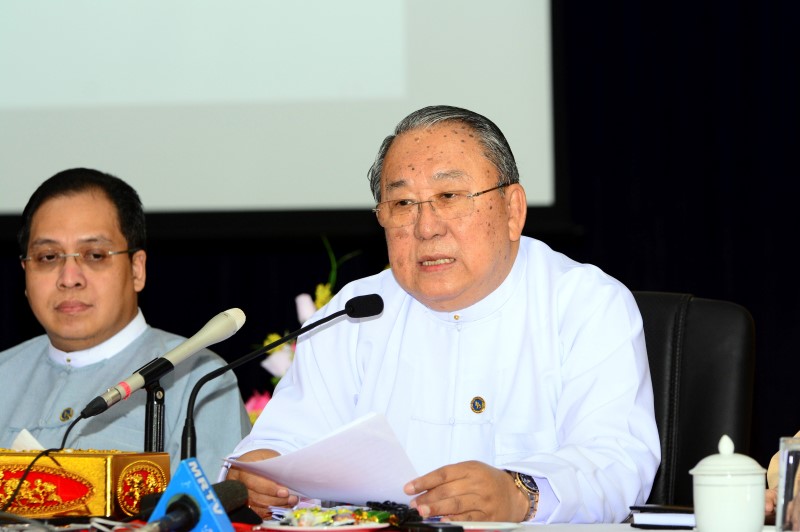By Timothy Mclaughlin and Antoni Slodkowski
YANGON (Reuters) – Myanmar’s Aung San Suu Kyi is standing by the country’s central bank governor, despite concerns from commercial bankers, government advisors and some of his own officials at the pace of reform on his watch. Central Bank of Myanmar (CBM) chief Kyaw Kyaw Maung is one of the last junta-era civilian officials to remain in a senior post since Suu Kyi’s National League for Democracy (NLD) took power earlier this year facing sky-high expectations that it can transform a country impoverished by decades of military rule. Reuters interviews with about two dozen government advisors, CBM insiders, economists and banking executives found widespread criticism that reform of the stunted financial sector was not being driven from the top – vital in a heavily top-down culture. “The keys to the castle sit in the central bank,” said Hal Bosher, advisor to the chairman and chief executive officer of Yoma Bank, one of the country’s biggest commercial lenders. Stalled reforms cited by people who spoke to Reuters included the development of a robust interbank market, building a bond market and relaxing overly stringent lending regulations.
The reforms are necessary, they say, to keep Myanmar’s economy growing rapidly and attract investment.
Defenders of the central bank say that, by not liberalizing too fast, it is promoting stability in the maturing financial system and avoiding dangerously fast credit growth.
In a speech at a meeting of the World Bank and International Monetary Fund (IMF) in Lima late last year, Kyaw Kyaw Maung himself said the transition to a modern financial system was complex and would take time. RULE OF LAW
According to a senior NLD economic advisor Suu Kyi is aware of the concerns, but, shortly after her landslide win in an election in November, a decision was made to keep Kyaw Kyaw Maung in his position. “Her judgment was we can’t have a situation where our first act in a democratic government committed to the rule of law she tries to oust the central bank governor,” the advisor said. “That is the type of thing that happens in Venezuela and Zimbabwe.” Although the law gives the government little scope to sack a central bank chief, many in the private sector had hoped the 77-year-old governor could be persuaded to retire, banking executives and officials said. Han Tha Myint, a senior NLD official who sits on the newly formed National Economic Coordination Committee (NECC), and a second senior advisor both confirmed that a decision had been taken not to seek to replace the CBM chief. Kyaw Kyaw Maung, who rarely speaks to the media or makes public appearances, did not respond to multiple requests for comment. An interview request was declined by the CBM, which also declined to answer questions submitted by Reuters by email. Suu Kyi’s spokesman, Zaw Htay, said the governor’s five-year term, which ends in 2018, was laid down by law.
SECOND STINT
Kyaw Kyaw Maung headed the central bank for a decade from 1997 to 2007, a period of international isolation. He was reappointed for a second stint in 2013 by then President Thein Sein, who led a quasi-civilian government of former generals. “His only quality was experience,” said lawmaker Soe Thane, who was a minister in the president’s office at the time.
Thein Sein’s term in office, which began in 2011, launched a period of wide-ranging political and economic reform. A managed float was adopted for the kyat currency in 2012 and the CBM was granted independence from the finance ministry in July 2013. Defenders say the bank has become more open during Kyaw Kyaw Maung’s second spell in charge.
“The bank is transparent about it – the previous government didn’t tell investors anything about its movements,” said Aung Thein Tun from Young Investment Group, a Myanmar conglomerate. Nine foreign banks were given licenses to operate in Myanmar on a limited basis in October 2014, with another four granted licenses last year.
But there have been no major announcements on modernization of the financial system since then.
Vikram Nehru, a senior associate at the Carnegie Endowment for International Peace, a Washington-based think-tank, said he was concerned that reforms at the CBM had come to a “virtual standstill”. TWO CRISES
Last year a crisis threatened to destabilize Myanmar’s nascent financial system, as the CBM’s efforts to prop up the kyat even as the black market exchange rate fell contributed to a shortage of dollars and increased currency speculation. “The Central Bank did not act, he [Kyaw Kyaw Maung] just sat still,” said a second senior advisor from the government’s NECC.
Another CBM official said the governor’s thinking had been shaped in a closed era when the junta could hold the official exchange rate at 6 kyat per dollar, despite it changing hands at 800 or more on the black market. “He simply doesn’t get you can’t do this anymore,” said the official, adding that only pressure from the president’s office and IMF forced the central bank to change course in mid-2015. In 2003, during Kyaw Kyaw Maung’s first stint as governor, a bank run prompted by the collapse of several small finance companies saw a large number of private lenders fail.
Then, the central bank failed to provide liquidity to banks to limit the contagion, wrote Sean Turnell, an economics professor at Australia’s Macquarie University who advises Suu Kyi, in his 2009 book “Fiery Dragons: Banks, Moneylenders and Microfinance in Burma”. (Additional reporting by Simon Webb, Aung Hla Tun and Shwe Yee Saw Myint; Editing by Alex Richardson)
Barrier to reform? Suu Kyi sticks with Myanmar central bank chief

By Timothy Mclaughlin and Antoni Slodkowski














